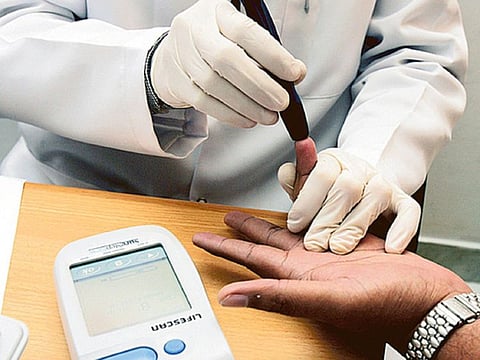World Diabetes Day: UAE doctors highlight rise in cases with atypical symptoms
Awareness of non-traditional symptoms needed, as disease rises in younger patients

Abu Dhabi/Dubai: Marking World Diabetes Day observed on November 14, doctors in the UAE have called for awareness about the rising trend in diabetes cases, particularly among young patients, with atypical and disguised symptoms.
While diabetes, a chronic condition that leads to elevated blood sugar levels, is traditionally characterised by symptoms like excessive thirst, frequent urination, and weight loss, doctors say it is now manifesting in unconventional ways.
Unusual Symptoms
When 20-year-old Usama Imtiaz Hussain had a fungal infection between his toes, never in his wildest dreams did he expect it would lead to a diabetes diagnosis. His dermatologist referred him to Dr Baiju Faizal, consultant, Internal Medicine, Lifecare Hospital, Mussafah.
Upon evaluation, it was found that Hussain had high blood sugar. His sugar values were above 300, and his HbA1c (three-month average of blood glucose) was 11. While Hussain had no family history of diabetes, he was overweight with a BMI of 32.
Younger patients
“This is the state of diabetes today. We are increasingly diagnosing type 2 diabetes at a young age, unlike before. Rather than classic symptoms of diabetes like increased urination, increased thirst or weight loss, these patients come with other complications like skin and urinary tract infections,” said Dr Faizal, who has advised Hussain with lifestyle modification and strict compliance with medication.
“Earlier patients diagnosed with diabetes were above 40 years of age, but now they are being diagnosed in their 20s and 30s. This is an alarming situation worldwide. The diagnosis of diabetes has a great impact on the patient’s life, both physically and psychologically. Diabetes can affect multiple organs like the heart, nerves, kidneys, and eyes. Therefore, it is important to screen for diabetes even at a younger age,” he added.
According to doctors, the challenge is that atypical symptoms in diabetes can often go unnoticed or misdiagnosed, leading to delayed treatment and potential complications. Early detection of diabetes is crucial for managing the condition effectively and preventing long-term health issues.
The prevalence of type 2 diabetes has been increasing in recent years, and the worldwide prevalence is 10 per cent of the adult population currently.

Incidental diagnosis
“The prevalence of type 2 diabetes has been increasing in recent years, and the worldwide prevalence is 10 per cent of the adult population currently. This rise has resulted in the incidental detection of cases. It is worthwhile to use every possible opportunity to screen for diabetes, especially for people with risk factors,” said Dr. Ajith Kumar, consultant endocrinologist, Medeor Hospital, Dubai.
Dr Kumar recalled the case of a 42-year-old patient who was incidentally diagnosed with diabetes when admitted to the hospital with symptoms of headache, insomnia, and acute worsening of positional vertigo with nausea.
The patient, Jameela Hasanabba, who has a family history of type 2 diabetes, said: “I was on follow-up treatment for hypothyroidism and positional vertigo related to ENT issues. Last year, due to a halt in my regular exercise programme coupled with erratic meals and lack of regular sleep, I had started gaining weight. When I was admitted to the hospital with vertigo, the doctors conducted a series of investigations that revealed I had diabetes.”
Dr Kumar gave her Diabetes Self-Management Education and Support Education (DSMES), an evidence-based practice for people with diabetes to gain the knowledge and skills to make behavioral changes and better control their condition.
After the DSMES, Hasanabba started therapy with medicine.
Rare complications
In some cases, patients experience severe complications of diabetes, which are often misdiagnosed as other health conditions. Dr Niyas Khalid, specialist, Internal Medicine, Burjeel Medical City, recalls the case of a young patient who had an extreme complication of diabetes.
I had a patient in his 30s who is a type 1 diabetic from a young age. He was experiencing fecal incontinence, especially during sleep, which was severely affecting his quality of life.

“I had a patient in his 30s who is a type 1 diabetic from a young age. He was experiencing fecal incontinence, especially during sleep, which was severely affecting his quality of life. He had persistent diarrhoea and experienced weight loss. He was very distressed as multiple extensive investigations and previous treatments hadn’t worked.
"After investigative tests, I found out he has exocrine pancreatic insufficiency, a condition in which the pancreas does not produce enough enzymes to digest his food. This is a long-term complication of diabetes that is less understood,” said Dr Khalid.
He put the patient on pancreatic enzyme replacement treatment, leading to a remarkable improvement in his condition.
Early detection, intervention
Recognising the importance of early detection and intervention, these experts are urging young patients to prioritise regular screenings for diabetes. They also emphasise the need for general practitioners to maintain vigilance regarding diabetes, even when it manifests with unconventional symptoms.
“At a general practice level, doctors should be aware of these complications and check for diabetes. Early aggressive treatment and control of sugar is imperative in preventing future complications,” concludes Dr Faizal.
Last month, the UAE launched a nationwide screening and interventional campaign targeting prediabetic residents titled ‘Show the Red Card to Diabetes.’
The health authorities in the country have joined hands with private entities for the one-year battle to prevent diabetes occurring in prediabetic individuals by conducting mass free screening programmes at workplaces followed by intervention through lifestyle modification to reduce the risk factors for diabetes.
Sign up for the Daily Briefing
Get the latest news and updates straight to your inbox






